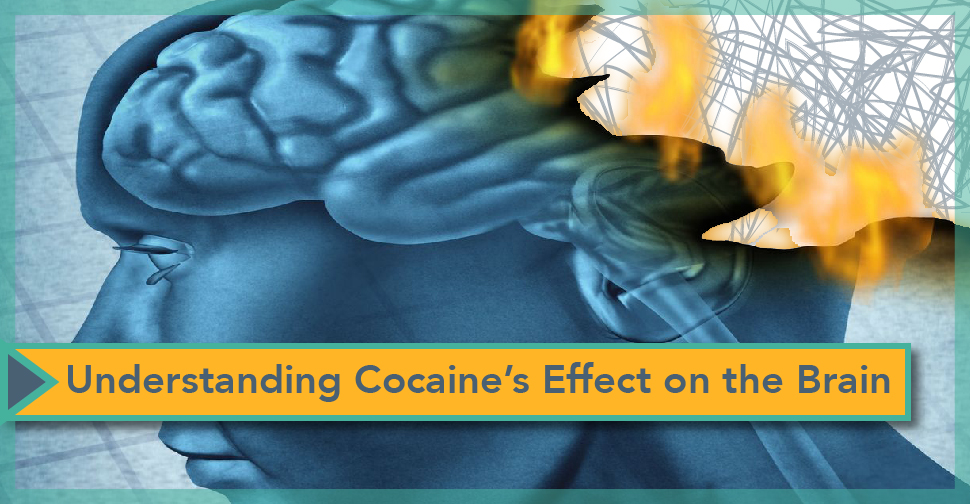
Cocaine’s effect on the brain has been dubbed “a silent disease” despite the far-reaching and immediate consequences. It’s not called a silent disease because it does little harm, but rather that those who ingest even small amounts of the substance semi-regularly are doing great harm. Even small cocaine exposures can quickly reduce the amount of oxygen-rich blood reaching the vital neural network of the brain. Cell death quickly follows. Premature aging of the brain can result in early onset dementia as well as other behavioral, social, and perceptual changes.
What Is Cocaine?
Cocaine is a highly addictive stimulant derived from the leaves of the coca plant. The effects of cocaine as a central nervous system stimulant include short-lived heightened focus and extreme euphoria. Use of the drug can also cause a number of cardiovascular complications including the constriction of blood vessels, elevated blood pressure and heart rate, and increased risk of stroke and heart failure.
Cocaine is available on the street as a highly refined powder that is water soluble and injectable or snorted via the nasal passage. Cocaine may also be smoked in the form of crack cocaine. Cocaine’s long-term effects can include damage to grey matter in the brain as well as other structural and biochemical and resulting behavioral changes.
Cocaine’s Immediate Effect On The Brain
When cocaine is first introduced to the body and brain, the resulting euphoria is intense. Cocaine generates a dopamine response related to the reward centers of the brain, and simultaneously increases norepinephrine and serotonin, which when released at levels sustained by cocaine use, leave a person experiencing a heightened level of focus and concentration, along with increased confidence or energy and euphoria associated with the dopamine release.
This high, however, is short-lived, often lasting 15 minutes, and can perpetuate use of the substance, or a cocaine binge. Unfortunately, as someone increases frequency or the amount of cocaine they are ingesting, their normal brain function begins to shut down. Natural release of dopamine, norepinephrine, and serotonin is suppressed as the body becomes dependent on cocaine for similar effects.
Cocaine’s Adverse Effects On The Brain
As abrupt as the effects of cocaine are felt, cocaine’s adverse impact on the brain is equally swift. New research indicates the cocaine-addicted brain ages at twice the rate of a normal brain. The loss of grey matter, the vital communication network in the brain, can lead to stroke and early-onset dementia.
Stroke is the result of reduced blood flow to the brain, common among individuals who abuse cocaine. And recent research at Harvard University shows that even low level exposure to cocaine can restrict blood flow to the brain. The researchers at Harvard exposed test subjects to relatively low amounts of cocaine, compared with what would normally be sold on the street. It was discovered that even at these extremely low doses, blood flow constriction occurred in nearly every subject. It follows that levels obtainable on the street generate an even greater adverse impact on brain health, reducing blood flow and vital oxygen to the cells that need it, resulting most often in the death of grey cell matter.
Cocaine’s Impact On Behavioral Controls Of The Brain
Areas of the prefrontal cortex of the brain are literally rewired by exposure to cocaine. The prefrontal cortex regulates everything from our personality to cognitive function, decision-making, and behavior. This area of the brain can change or adapt over time as necessary to external stimuli, including stress, but when a powerful stimulant like cocaine is introduced, this rewiring can take place in a matter of days and weeks.
One experiment involving mice indicated that when given the choice of an uncomfortable enclosure versus a comfortable enclosure, mice chose the comfortable environment. However, when confined to the uncomfortable enclosure and exposed to cocaine, then re-tested, the mice quickly began showing preference for the uncomfortable enclosure they previously rejected.
This same region of the brain, when altered by cocaine, can turn a moral and sensible individual into a person capable of criminal and violent behaviors. In a healthy individual, the prefrontal cortex regulates decision making and is involved in sorting good thought processes from bad, associates positive action with positive results, avoids negative consequences by avoiding behaviors or situations that are more like to result in negative consequences, etc. In the cocaine-addicted brain, this highly social and regulated part of the brain becomes chaotic and may result in violent outbursts, antisocial behaviors, and an inability to associate action with consequence.
Studies have found a correlation between repeated exposure to cocaine generates a wide range of related psychological symptoms in addition to impaired cognitive function, including paranoia, social avoidance or withdrawal, severe insomnia, anxiety, impulsivity, delusions, hallucinations, violent outbursts, homicidal or suicidal thoughts or actions, and depression.
Treat The Addiction, Heal The Addicted Brain
Healing the brain after an addiction to cocaine is one of the greatest challenges to long-term recovery. It can take months for dopamine levels to return to any pre-cocaine exposure levels, resulting in feelings of apathy, lethargy, and general malaise. This is one of the primary reasons for relapse in the first year of recovery.
Cravings for cocaine as well as depression and the symptoms described above can persist for months. Managing these and other withdrawal side effects is one way to improve the long-term success outcome for the cocaine-addicted individual, as well as reducing overall harm to the brain.
Locate Treatment Options Near You For Cocaine Addiction
DrugRehab.org is an online resource designed to connect you with the drug treatment options that meet your individual needs and preferences.Let us connect you with the professional support and evidence-based drug treatment programs that can help you reclaim your life from a cocaine addiction. Contact us and discover a new and rewarding life in recovery beginning today.


